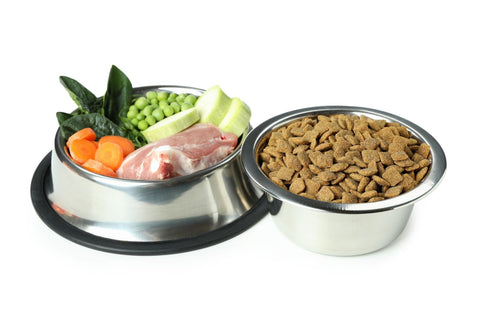
Dogs are not just pets; they're members of our families, deserving of the best care and nutrition we can provide. As conscientious pet owners, we must decide whether to feed our furry companions homemade or store-bought food.
With a commitment to informed decision-making and a focus on our dogs' well-being, we can ensure they receive the nourishment they deserve as beloved family members.
In this comprehensive guide, we'll explore the pros and cons of both options, helping you make an informed decision that prioritizes your dog's health and well-being.
Understanding Canine Nutritional Needs:
Before delving into the debate of homemade versus store-bought dog food, it's essential to understand the nutritional requirements of our canine companions. Dogs are omnivores, requiring a balanced diet of protein, carbohydrates, fats, vitamins, and minerals. Proteins, derived from animal or plant sources, are crucial for muscle development, while carbohydrates provide energy. Fats are necessary for healthy skin and coat, and vitamins and minerals are essential for overall health.
Homemade Dog Food
Homemade dog food allows pet owners to customize their dog's nutrition, but it also poses challenges and considerations. In this discussion, we'll explore the benefits and drawbacks of homemade dog food to help pet owners make informed decisions about their canine companions' diets.
Control Over Ingredients
Freshness and Quality
Ingredient Transparency
Drawbacks of Homemade Dog Food
Homemade dog food has gained popularity among pet owners seeking personalized nutrition for their canine companions. However, this approach has drawbacks and challenges that can compromise dogs' health and well-being.
Nutritional Imbalance
Time and Effort
Cost Considerations

Store-bought Dog Food
Store-bought dog food offers convenience and variety, ranging from kibble to canned to freeze-dried. Some advantages of store-bought dog food include:
Convenience
Complete and Balanced Formulations
Affordability of Store-bought Dog Food
Downsides of Store-bought Dog Food
While store-bought dog food offers convenience and accessibility, it has downsides and limitations. Despite being formulated to meet dogs' nutritional needs, some commercial options may contain low-quality ingredients, additives, and preservatives that can negatively impact dogs' health. In this discussion, we'll explore the drawbacks of store-bought dog food, highlighting essential considerations for pet owners to make informed choices about their dogs' diets.
Ingredient Quality
Lack of Ingredient Transparency
Risk of Contamination
Homemade and Store-bought Dog Food
Ultimately, the decision between homemade and store-bought dog food depends on your dog's needs, lifestyle, and preferences as a pet owner. Here are some tips for making an informed decision:
Consult With a Veterinarian
Consider Your Lifestyle
Read Dog Food Labels Carefully
Monitor Your Dog's Health
Navigating the Choice: Homemade vs. Store-bought Dog Food
Ultimately, the decision between homemade and store-bought dog food should be carefully considered, taking into account your dog's unique needs and your circumstances.
While homemade food allows greater control over ingredients, store-bought options offer convenience and often meet specific nutritional standards. Consulting with a veterinarian can provide valuable insight into which option may best suit your dog's health and well-being, ensuring that your dog receives the balanced nutrition it needs to thrive.
With careful consideration and expert guidance, you can choose to prioritize your dog's overall health and happiness.
Your dog's health and well-being are our top priorities, and we're here to help you ensure they thrive. Visit our Pawlistic blog now and journey to optimal canine nutrition.

